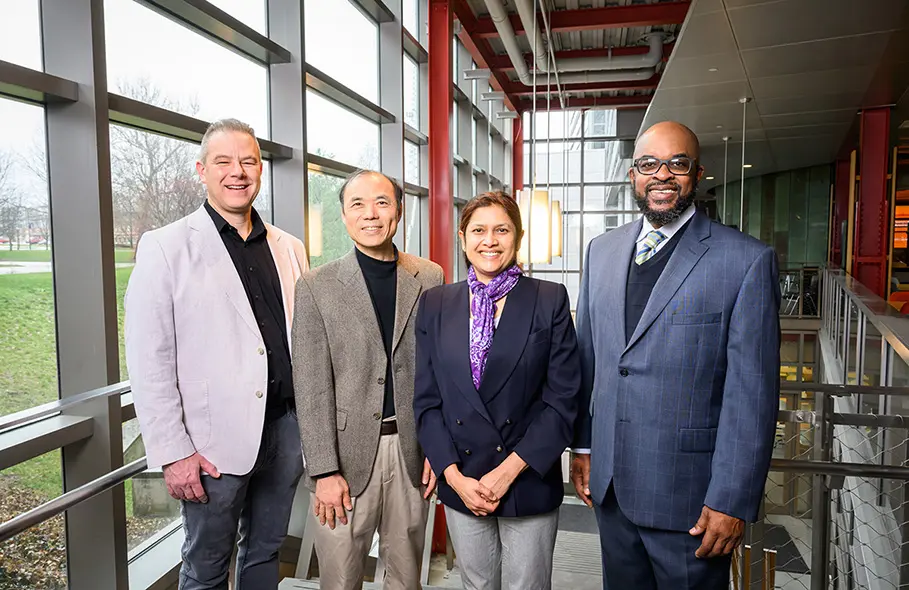U. of I. to Lead National Artificial Intelligence Research Institute Focused on STEM Learning
by Sharita Forrest, UI News Bureau / May 4, 2023

INVITE leadership team, from left: H. Chad Lane, ChengXiang Zhai, Suma Bhat, and Rodney Hopson.
Scientists at the University of Illinois Urbana-Champaign will lead a national Artificial Intelligence Research Institute focused on developing learning technologies that accelerate young people’s achievement in science, technology, engineering and math.
The National Science Foundation announced today it is awarding $20 million over five years to establish the Inclusive and Intelligent Technologies for Education (INVITE) Institute, based in the College of Education at the Urbana campus. About $8 million of the funding will go to the U. of I., with eight faculty members and their teams across four departments collaborating on the project.
The leadership team includes scientists from the nonprofit Educational Testing Service, Temple University, and the University of Florida.
“The NSF’s support enables us to pursue transformative interdisciplinary research in AI, the learning sciences and psychology, and to couple that with aggressive outreach and AI education efforts so we can reach students and teachers at a national scale,” said INVITE director H. Chad Lane, a professor of Educational Psychology, Computer Science and Curriculum and Instruction at the U. of I.
Lane conducts research on the design, use and impact of intelligent technologies in education, blending AI techniques with those from the entertainment industry to foster user engagement and STEM learning.
A key purpose of the INVITE research is to broaden engagement with and learning of STEM among historically marginalized groups at the prekindergarten-12th-grade levels by investigating emerging AI techniques and building intelligent technologies.
“We know a strong foundation in STEM disciplines for K-12 students is an incredibly important determining factor in educational and professional achievement and success across their lives and careers,” said U. of I. Chancellor Robert J. Jones.
“Harnessing the power and potential of AI to deliver consistent, accessible and high-quality technologies to address the needs of those learners who are traditionally most underserved and underrepresented in our schools offers a transformational opportunity for our nation’s entire educational system. INVITE takes the aspirational idea of ‘education for all’ and gives us a path to make it a reality for generations to come.”
More than 96,000 youths across 24 school districts will be engaged in enhanced STEM learning using INVITE platforms designed to promote persistence, academic resilience and collaboration, qualities that research has shown are critical to academic achievement. Schools, universities, community organizations and museums will provide formal and informal learning opportunities – emphasizing hands-on activities related to real-world challenges.
“Harnessing the power of artificial intelligence and using it responsibly presents one of the greatest technological challenges and opportunities of our generation,” said Illinois Congresswoman Nikki Budzinski. “I’m thrilled to see the U. of I. continuing to lead in exploring this space with the establishment of the AI Institute for Inclusive Intelligent Technologies for Education. I look forward to seeing the exciting research that will come out of this center and how it can support our nation’s students and educators.”
With computing resources in the U. of I.’s College of Education, the Grainger College of Engineering and INVITE’s partnering universities and organizations, teams will collect large-scale datasets from diverse populations to create digital environments that are welcoming and inclusive for underrepresented groups such as girls and students of color.
These data will be used to develop intelligent learning systems that are socially aware – flexible and responsive to students’ interests, sociocultural influences, cognitive needs and behavior, surpassing current technologies by inferring individuals’ needs and dynamically adjusting instruction.
“One of the biggest obstacles to AI advances in learning is the lack of shareable datasets for K-12 students,” said co-principal investigator Cheng-Xiang Zhai, the Donald Biggar Willett Professor of Engineering in the department of computer science at the U. of I. “We will remedy this by collecting large representative datasets with rich contextual information about learner interactions to enable foundational advances in AI areas, including fair and robust machine learning, natural language processing and socially intelligent agents.”
Zhai’s research interests include building intelligent learning systems and developing intelligent algorithms for optimizing AI-human interaction and collaboration. He and co-PI Diego Zapata-Rivera, the Distinguished Presidential Appointee with the nonprofit Educational Testing Service, will co-direct the institute’s research.
The INVITE leadership team also includes managing director Kristy Boyer, a professor of computer science at the University of Florida; and Jamie Payton, the director of community engagement and outreach, who is a professor and the co-chair of computer and information sciences at Temple University.
Rodney Hopson, a professor of evaluation in Educational Psychology at the U. of I. is INVITE’s evaluation director. Other U. of I. faculty members working on the project are electrical and computer engineering professor Suma Bhat; Curriculum and Instruction professors Jina Kang, Robb Lindgren and Luc Paquette; computer science professor Colleen Lewis; and Educational Psychology professor Jessica Gladstone.
INVITE is among seven national AI Institutes established this year – and it marks the third of these under the direction of U. of I. scientists since the NSF-led AI Institutes Program was launched in 2020.
The NSF’s funding partners include the U.S. Department of Defense Office of the Under Secretary of Defense for Research and Engineering; the U.S. Department of Education Institute of Education Sciences; the U.S. Department of Homeland Security; the National Institute of Standards and Technology; the U.S. Department of Agriculture’s National Institute of Food and Agriculture; and IBM.
Learn more from the UI News Bureau story...
.webp?sfvrsn=4d3d3704_1)


